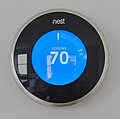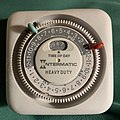User:Pat Palmer/sandbox/test4: Difference between revisions
Pat Palmer (talk | contribs) mNo edit summary |
Pat Palmer (talk | contribs) mNo edit summary |
||
| Line 1: | Line 1: | ||
{{TOC|right}} | {{TOC|right}} | ||
A '''smart home''' is a household that includes one or more forms of home automation, which in turn refers to a hodge-podge of technological solutions for automating the operation of lights, locks, and possibly many other devices, in a house. | A '''smart home''' is a household that includes one or more forms of home automation, which in turn refers to a hodge-podge of technological solutions for automating the operation of lights, locks, and possibly many other devices, in a house. An enormous industry involving dozens of companies has sprung up offering products for voice recognition and assistance with "smart" lighting, keyless door entry, security cameras and systems, smart plugs, smart switches, smart thermostats, smart TV's and streaming devices, smart smoke detectors, smart (and robotic) vacuum cleaners, smart lawn watering systems, and many more. "Smart" in this context means that small, powered devices make use either of the home network (wifi) or other forms of radio signals to provide, not just remote control, but scheduling and complex interactions of multiple smart devices. | ||
Of course, since there was no standards, what grew up was a jungle, and that jungle is in the process of organizing itself. A new "smart home" standard is emerging due to an industry consortium. The new standard is called "Matter", and as of 2023, the first Matter-compliant devices are appearing in the marketplace. Most major vendors have committed to adhering to the basics of the emerging standard within a few years (with the exception of Wemo, which announced in 2023 that it would "opt out"). Any company *not* trying to meet the standard is taking a big risk of loss of market share in the future. | |||
== lighting history == | == lighting history == | ||
Revision as of 10:20, 10 April 2023
A smart home is a household that includes one or more forms of home automation, which in turn refers to a hodge-podge of technological solutions for automating the operation of lights, locks, and possibly many other devices, in a house. An enormous industry involving dozens of companies has sprung up offering products for voice recognition and assistance with "smart" lighting, keyless door entry, security cameras and systems, smart plugs, smart switches, smart thermostats, smart TV's and streaming devices, smart smoke detectors, smart (and robotic) vacuum cleaners, smart lawn watering systems, and many more. "Smart" in this context means that small, powered devices make use either of the home network (wifi) or other forms of radio signals to provide, not just remote control, but scheduling and complex interactions of multiple smart devices.
Of course, since there was no standards, what grew up was a jungle, and that jungle is in the process of organizing itself. A new "smart home" standard is emerging due to an industry consortium. The new standard is called "Matter", and as of 2023, the first Matter-compliant devices are appearing in the marketplace. Most major vendors have committed to adhering to the basics of the emerging standard within a few years (with the exception of Wemo, which announced in 2023 that it would "opt out"). Any company *not* trying to meet the standard is taking a big risk of loss of market share in the future.
lighting history
- incandescent --> flourescent --> halogen --> compact flourescent --> LED
- Kelvin rating; disposal; cost; lifetime; manufacturing resources; industry
- motion sensors
history
remotes: the earliest vestige
- TV
- DVR
- "cable"
- garage door openers
- air filters
- timers on ovens or cookers or coffee makes (either to turn off, or start, cooking)
- motion sensors
- TIMERS: mechanical --> digital --> smart
do it yourself via home-made controllers
- Home Assistant open source kit
the new Matter standard
creating combining and extensibility
- IFTTT
- routines (Google)
- Alexa "Skills"
Older stuff
- timers (mechanical)
- timers (digital, with battery backup, but not really smart)
- light switch on closet hall door
remote controls
- air filters
- garage door openers
- TV's etc
- DVR's
smart appliances
- fridges
- lawn watering systems
What we have
- wifi
- wireless doorbell (back door)
- wildlife camera
- Nest cams (3, two types)
- smart lights (Hue)
- Chromecast (streaming wifi device)
- whole-house energy monitor (Sense)
- smart plugs (Kasa) - dehumidifier, fan, lights, camera - indoor AND outdoor
- Kill-A-Watt usage energy measurement device
- smart switch (Kasa) on the wall
- robotic vacuum cleaner (iRobot Roomba i7+)
- smart smoke alarms (Google) in hallway and basement
- smart thermostat (Nest Learning Thermostat) with extra room sensors
- smart clock (Echo clocks in LR, dining rm, bedroom, backroom)
- smart speakers
- Google mini (small, round)
- Google Hub Gen2 (bedrooms, LR corner)
- Google Hub (dining room)
- Amazon Echo (with clock) in bath, bedroom, backroom
- Amazon Echo Spot (clock) in LR
- Amazon Alexa (big) in dining room
- Amazon Echo (smaller) in LR corner
Had in the past:
- Amazon Echo Glow
Amazon categories
- lighting
- smart entry
- security cameras and systems
- plugs and outlets
- new smart devices (?)
- climate control
- detectors and sensors
- home entertainment
- pet
- voice assistants and hubs (aka "smart speakers")
- kitchen
- vacuums and mops
- lawn and garden
- wiki and networking
- other solutions (?)
Appliances with built-in automation
- Oven
- Coffee maker
- Slow cooker
- Motion-sensor lights (by door, corner or house)
Companies
- Philips Hue
- TP-Link Kasa
- (Wemo)
- Amazon
- Nest
- Sense
Related articles
- Wi-Fi Protected Access - WPA2 encryption for wifi
- Smartphone
- Android (smartphone)
- Network
- Network architecture
- Fiber optic
- Satellite
- Radio
Gallery
Links
- Apr 2023 The Home Assistant SkyConnect The Verge
- Jan 2023 Matter tutorial The Verge
- Sept 2022: Coming this fall (Matter) The Verge
- May 2022: The Verge: Google on Matter The Verge
- Apr 2022: Wired Mag
- Mar 2022: The Verge The Verge
- Mar 2022: https://www.theverge.com/2022/3/17/22982166/matter-smart-home-standard-postponed-fall-2022 The Verge
- Copied from Wikipedia? (possible delete needed): User:Pat_Palmer/sandbox/todo_list/Home_automation The Verge
- From WP on 3/15/2021: User:Pat Palmer/sandbox/Home automation
- The Verge:Matter standard details 2021
- CNET Amazon Google Apple smarthome cert. alliance
- WP: Home automation companies
- WP: List of home automation software and hardware
- WP: List of home automation topics
- WP: Home automation for the elderly and disabled
- WP: Home network
- WP: Home robot
- WP: Internet of Things
- WP: Smart device]
- WP: smart speaker
- WP: Web of Things
Sub topics
- lighting
- cameras
- TV's
- thermostats
- blinds
- hot water heaters
Always On wattages
Some wattages (re: phantom or always-ON energy)
- Desktop computer: 21.13W
- Laptop computer: 15.77W
- Laser fax/printer: 6.42W
- Subwoofer: 10.7W
- Cable modem: 3.85W
- Digital cable/DVR set-top box: 43.46W
- DVD or Blu-Ray players 10.58 W
- Video game console: 23.34W
- Garage door opener: 4.48W
- Microwave: 3.08W


